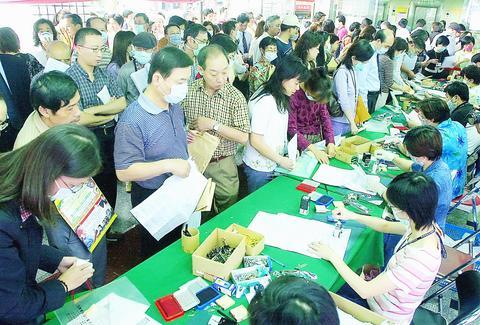If you haven't filed your taxes for last year yet, you're not alone. As of yesterday, more than half of those required to file taxes hadn't. But there is still time.
Tax offices will remain open until 7pm on Monday -- the last day people can file their taxes -- while the online tax-filing system will be open until midnight.
Officials said yesterday that a record 55 percent, or 2.73 million of the nation's 5 million single and joint filing taxpayers, had failed to complete the dreaded annual chore, even though they have only two working days left to do so.

PHOTO: LIAO CHENG-HUEI, TAIPEI TIMES
Chen Wen-tzong (
Chen urged all taxpayers to file before the deadline or take advantage of the 24-hour online tax-filing system and pay with credit cards if they owe taxes.
The tax-filing rate in Taipei is similar to the nationwide average. According to Chen, 327,000 taxpayers -- or 49 percent -- of the capital city's 800,000 taxpayers have filed taxes.
And for Taipei's nearly 20,000 expatriate taxpayers -- who cannot use the online tax-filing system program -- Chen yesterday reminded them to file as soon as possible lest they waste time waiting in long lines at the tax offices.
With members of the public preferring to stay home to reduce the risk of catching SARS, Chen said that the number of people filing taxes online had increased by nearly 150 percent from last year.
So far, 640,000 taxpayers had logged on to the Internet to file their income tax reports compared to 280,000 during the same period last year, Chen said, adding that he expected to see more last-minute online filings.
The finance ministry said on Monday that health workers tending to SARS patients would be given another month to file their taxes.
According to the Ministry of Finance, Taiwan may face a shortfall of NT$106.6 billion in tax revenues this year, including a shortage of NT$5.2 billion in business taxes and NT$6.2 billion in securities-exchange transaction tax following the SARS epidemic.
To offset the tax losses, Minister of Finance Lin Chuan (

Conflict with Taiwan could leave China with “massive economic disruption, catastrophic military losses, significant social unrest, and devastating sanctions,” a US think tank said in a report released on Monday. The German Marshall Fund released a report titled If China Attacks Taiwan: The Consequences for China of “Minor Conflict” and “Major War” Scenarios. The report details the “massive” economic, military, social and international costs to China in the event of a minor conflict or major war with Taiwan, estimating that the Chinese People’s Liberation Army (PLA) could sustain losses of more than half of its active-duty ground forces, including 100,000 troops. Understanding Chinese

The Ministry of Foreign Affairs (MOFA) yesterday said it is closely monitoring developments in Venezuela, and would continue to cooperate with democratic allies and work together for regional and global security, stability, and prosperity. The remarks came after the US on Saturday launched a series of airstrikes in Venezuela and kidnapped Venezuelan President Nicolas Maduro, who was later flown to New York along with his wife. The pair face US charges related to drug trafficking and alleged cooperation with gangs designated as terrorist organizations. Maduro has denied the allegations. The ministry said that it is closely monitoring the political and economic situation

UNRELENTING: China attempted cyberattacks on Taiwan’s critical infrastructure 2.63 million times per day last year, up from 1.23 million in 2023, the NSB said China’s cyberarmy has long engaged in cyberattacks against Taiwan’s critical infrastructure, employing diverse and evolving tactics, the National Security Bureau (NSB) said yesterday, adding that cyberattacks on critical energy infrastructure last year increased 10-fold compared with the previous year. The NSB yesterday released a report titled Analysis on China’s Cyber Threats to Taiwan’s Critical Infrastructure in 2025, outlining the number of cyberattacks, major tactics and hacker groups. Taiwan’s national intelligence community identified a large number of cybersecurity incidents last year, the bureau said in a statement. China’s cyberarmy last year launched an average of 2.63 million intrusion attempts per day targeting Taiwan’s critical

AGING: As of last month, people aged 65 or older accounted for 20.06 percent of the total population and the number of couples who got married fell by 18,685 from 2024 Taiwan has surpassed South Korea as the country least willing to have children, with an annual crude birthrate of 4.62 per 1,000 people, Ministry of the Interior data showed yesterday. The nation was previously ranked the second-lowest country in terms of total fertility rate, or the average number of children a woman has in her lifetime. However, South Korea’s fertility rate began to recover from 2023, with total fertility rate rising from 0.72 and estimated to reach 0.82 to 0.85 by last year, and the crude birthrate projected at 6.7 per 1,000 people. Japan’s crude birthrate was projected to fall below six,